PLENARY KEYNOTES
ROOM LOCATION: Constitution A
Thursday, October 6, 2022 |8:10 am - 12:00 pm ET
7:00 am - 8:10 am Registration and Morning Coffee
8:10 am Chairperson’s Remarks: How AI is Enabling Resiliency in Federal Agencies
 Adelaide O’Brien, Research Vice President, IDC Government
Insights
Adelaide O’Brien, Research Vice President, IDC Government
Insights
Applications based on artificial intelligence (AI), machine learning, and continual deep learning are transforming how consumers, enterprises, and agencies work, learn, and interact. AI has the potential to significantly impact mission outcomes through
strategic leadership, employee skills and citizen engagement. Federal agencies are applying AI technologies to these fundamental processes and incorporating AI into the fabric of their mission to become digitally resilient. This session will address
federal government challenges, trends and tangible benefits in using AI.
8:30 KEYNOTE: Equity & Effectiveness in AI
 Chike Aguh, Chief Innovation Officer, U.S. Department of Labor
Chike Aguh, Chief Innovation Officer, U.S. Department of Labor
8:55 KEYNOTE: Art of the possible with AWS AI
 Wilfred Justin, Head of Modernization, Partners,
WWPS, AWS
Wilfred Justin, Head of Modernization, Partners,
WWPS, AWS
Join us to learn about how AWS technologies can inspire your business to innovate and the art of the possible with AI and ML. This will provide an overview of the AWS AI/ML stack, the differentiators of the platform, and how partners are leveraging AWS ML stack to deploy workloads on behalf of Government agencies. Learn about use cases in Public Sector that are being addressed by AWS ML stack and most importantly how AWS partners can take advantage of Rapid Adoption Assistance that would help them to build machine learning workloads using AWS ML stack by engaging with a team of AWS experts at no cost.
9:20 KEYNOTE: Building Equitable & Fair AI Driven Ecosystems
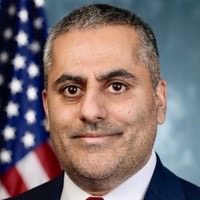 Anil (Neil) Chaudhry, Director, Federal AI Implementations, U.S.
General Services Administration (GSA)
Anil (Neil) Chaudhry, Director, Federal AI Implementations, U.S.
General Services Administration (GSA)
For large organizations looking for “what works” in delivering and implementing fair and equitable AI services at scale, Anil Chaudhry will offer some practical tips and best practices from GSA’s AI Center of Excellence.
9:45 Networking Coffee Break in the Exhibit Hall
10:30 KEYNOTE: Implications of Artificial Intelligence (AI)/Machine Learning (ML) for Equal Employment Opportunity
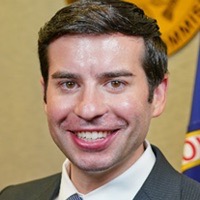 Keith Sonderling, Commissioner, US Equal Opportunity Commission
Keith Sonderling, Commissioner, US Equal Opportunity Commission
Commissioner Sonderling will address the implications of Artificial Intelligence (AI)/Machine Learning (ML) for equal employment opportunity. Employers are using AI to make employment decisions at every stage of the job life cycle, from hiring to promotion
to firing. AI-driven technologies have the potential to make the workplace more open, fair, and inclusive by eliminating unlawful discrimination from employment decisions. However, AI can also amplify workplace bias if it is poorly designed or carelessly
deployed.
- Overview of the legal framework governing AI in the US
- Key ways the US civil rights laws protect employees from discrimination by algorithm
- Suggest ways that employers can reap the benefits of AI while respecting the rights of workers
10:55 Scaling AI Across the Government
 Matthew Hoover, PhD, Lead Data Scientist, Data Robot
Matthew Hoover, PhD, Lead Data Scientist, Data Robot
Implementing AI, as it turns out, is difficult. It takes time, resources, and the right problem to solve to make an AI solution effective. Moreover, building a solution is only part of the issue; ensuring it stays relevant and accurate requires even more effort. This is for a single model, so how do we move from a single model to scale solutions throughout the government? This talk will discuss the challenges and solutions to help government enable their workforce with AI and at scale.
11:20 KEYNOTE: Ethical AI – The Age of Trust and Transparency for the Human-Machine American Dream
 Matthew James Bailey, Founder & CEO, AIEthics.World
Matthew James Bailey, Founder & CEO, AIEthics.World
 Louis Barbier, PhD, Associate Chief Scientist, NASA
Louis Barbier, PhD, Associate Chief Scientist, NASA
For the United States to successfully flourish within the age of humans and machines, it is imperative that its moral principles are codified, standardized, and transparently embodied within artificial intelligence – Ethical AI. The status of
these moral and ethical principles within artificial intelligence must be measurable to understand their degree of compliance and progress their quality. The benefit of Ethical AI is the confident alignment of artificial intelligence with the
moral principles of the United States and progression of its nation from the time of chaotic machines (today), into a new era of trust and transparency, resulting in a thriving human-machine American dream.
In this panel, Matthew James Bailey (AIEthics,World) and Louis Barbier (NASA) will discuss breakthrough Ethical AI methodologies enabling government to codify, standardize and transparently measure the ethical quality of their moral fabric for human-machine
societies.
12:00 Boxed Luncheon Available in the Exhibit Hall
12:45 Dessert Break in the Exhibit Hall
Friday, October 7, 2022 |8:15 - 11:55 am ET
7:30 - 8:15 am Registration and Morning Coffee
8:15 Chairperson’s Remarks: Artificial Intelligence and the 21st Century Government Agency
 Kashyap Kompella, CFA, Chief Analyst, RPA2AI Research
Kashyap Kompella, CFA, Chief Analyst, RPA2AI Research
8:30 KEYNOTE: Panel Discussion: Ensuring You Have the Right People, Process, and Technology in Place to Implement Your AI Model
 Moderator: James Cooper, Professor, Director, International
Legal Studies, California Western School of Law
Moderator: James Cooper, Professor, Director, International
Legal Studies, California Western School of Law
 Renata Miskell, Chief Data & Analytics Officer, HHS Office
of Inspector General
Renata Miskell, Chief Data & Analytics Officer, HHS Office
of Inspector General
 Ola Olude-Afolabi, PhD, AI - PM & Administrator,
DOC AI Center of Excellence - OCTO, U.S. Department of Commerce
Ola Olude-Afolabi, PhD, AI - PM & Administrator,
DOC AI Center of Excellence - OCTO, U.S. Department of Commerce
 Calvert Smith, Director, Cloud Adoption, Center of Excellence,
U.S General Services Administration (GSA)
Calvert Smith, Director, Cloud Adoption, Center of Excellence,
U.S General Services Administration (GSA)
 Ashley Miller, Sr. AI/ML Evangelist, AWS
Ashley Miller, Sr. AI/ML Evangelist, AWS
How do you determine where to start with AI implementation to ensure the optimum outcome for your organization? Hear case studies, discussion, and advice on getting approaches to implementing the best people and processes for your AI applications.
Discussion based, but not limited to:
PEOPLE: Getting leadership and communication right; exploring hiring practices for data scientists; legal and usability considerations; privacy practices.
PLAN: Where do you start? And how do you
win over skeptics to gain buy-in? How to come up with viable investment and financial strategies?
PROCESSES: Integrating ethical AI; achieving interoperability and scale.
PARTNERS: Deciding on build vs. buy models; sourcing and choosing
the correct partner for you; understanding which platforms, tools, system, etc.
9:20 KEYNOTE: Equity & Scaling and Operationalizing AI to Protect Health and Save the Lives of At-Risk Populations in Disasters
 Kristen Finne, Director, HHS emPOWER Program and Senior Program
Analyst, Administration for Strategic Preparedness and Response (ASPR), U.S. Department of Health and Human Services
Kristen Finne, Director, HHS emPOWER Program and Senior Program
Analyst, Administration for Strategic Preparedness and Response (ASPR), U.S. Department of Health and Human Services
This presentation will provide an overview of AI capabilities currently used by the U.S. Department of Health and Human Services to protect and save the lives of vulnerable populations prior to, during and after emergencies disasters. Optimization
and scaling of these AI capabilities advanced equitable planning for, outreach to and assistance in accessing COVID vaccine and therapeutics.
9:45 Networking Coffee Break in the Exhibit Hall
10:25 KEYNOTE: Defending Humanity: The Unintended Consequences of AI Without Governance
 Carl Hahn, VP & Chief Compliance Officer, Northrop Grumman
Carl Hahn, VP & Chief Compliance Officer, Northrop Grumman
 Jean-Luis Caamaño, Head of Customer Success,
Credo AI
Jean-Luis Caamaño, Head of Customer Success,
Credo AI
From object detection to decision-support, AI has the ability to dramatically transform government. But it is also raising new questions around areas like fairness, accountability and transparency. Without clear guidance on current and future laws, many government leaders grapple with what good AI looks like and how to put principles into action across their organizations. Carl Hahn, VP & Chief Compliance Officer, Northrop Grumman and Jean-Luis Caamaño, Head of Customer Success at Credo AI will discuss the current landscape, key challenges facing the industry, and best practices to enable public sector agencies, vendors and individuals to deliver Responsible AI at scale.
10:50 KEYNOTE: Applying Oversight to Realize Accountable AI
 Taka Ariga, Chief Data Scientist and Director of Innovation
Lab at US Government Accountability Office
Taka Ariga, Chief Data Scientist and Director of Innovation
Lab at US Government Accountability Office
In 2021, the Government Accountability Office (GAO) published an Artificial Intelligence (AI) accountability framework to help managers ensure accountability and responsible use of artificial intelligence (AI) in government programs and processes.
This framework is built upon four complementary principles including governance, data, performance, and monitoring. For each principle, the framework describes key practices for federal agencies and other entities that are considering, selecting,
and implementing AI systems. Each practice includes a set of questions for entities, auditors, and third-party assessors to consider, as well as procedures for auditors and third- party assessors. As oversight entities mobilize to address accountability
challenges associated with AI, learn how this framework has successfully been used to apply oversight across federal agencies in a manner that is efficient, equitable, economical, and ethical.
11:15 KEYNOTE Panel Discussion: Artificial Intelligence: What’s Next?

Moderated by: Parna Sarkar-Basu, CEO & Founder, Brand and Buzz Marketing
Panelists:
 Christy Sheehy, PhD, Co-Founder &
CEO, C.Light Technologies
Christy Sheehy, PhD, Co-Founder &
CEO, C.Light Technologies
 Humera Malik, CEO, Canvas AI
Humera Malik, CEO, Canvas AI
The adoption of artificial intelligence has expanding rapidly. Innovators and researchers are identifying new ways to use the technology – from retina tracking to predict disease and its progression to boosting manufacturing and impacting climate
change. Yes, we’ve come a long way with AI. But what’s next? In this session, entrepreneurs and experts will discuss:
- The state of AI today
- AI and governance
- Challenges and opportunities
- AI for good
- And more
11:55 Boxed Luncheon Available in the Exhibit Hall
12:40 Dessert Break in the Exhibit Hall
TRACK 1: Business Outcomes & Workplace Transformation
ROOM LOCATION: Constitution B
Thursday, October 6, 2022 |1:15 - 4:30 pm ET
1:15 pm Chairperson’s Remark
 Matthew James Bailey, Founder, CEO, AIEthics.World
Matthew James Bailey, Founder, CEO, AIEthics.World
1:30 Practices for Understanding Your Data for Improved Business Outcomes
 Richard Patterson, Chief Data Officer, Defense Security
Cooperation Agency
Richard Patterson, Chief Data Officer, Defense Security
Cooperation Agency
If you can’t make sense of your data, then AI won’t be able to either. This session will provide actionable advance for better understanding your data and making it usable for AI and ML for improved business outcomes.
1:55 Assessing Employee Feedback to Inform Workplace Culture Improvements: Tips from VA
 Katerine Osatuke, PhD, Supervisory Health Scientist/Research
Director at Department of Veterans Affairs
Katerine Osatuke, PhD, Supervisory Health Scientist/Research
Director at Department of Veterans Affairs
During this session, the Department of Veterans Affairs will provide insights into how they are making workplace culture improvements utilizing AI capabilities. This includes:
1. Planning and consistently tracking which employee experience aspects
are strategically important.
2. Sharing Data to:
- Provide transparency to promote trust.
- Deliver the right level of feedback to the right level of leadership—to promote relevance and actionability.
- Hold action planning conversations throughout the organization—to enable turning feedback into improvements.
3. Data Use: Measuring and reporting whether employee feedback has been put to organizational action—to promote employee engagement and leadership accountability.
2:20 Inspiring Use of Artificial Intelligence (AI) in Highway Transportation
 David Kuehn, Program Director, Federal Highway Administration
David Kuehn, Program Director, Federal Highway Administration
Hear the transformative steps taken to innovate process and outcomes. Journey through:
- Highway transportation research motivations
- Mobility
- Safety
- Reliability
- AI in highway transportation: the state of the practice
- Expert systems
- Inference across data records
- Computer vision for detecting and classifying objects
- AI in highway transportation: Vision for the future
- Computer vision for detecting, classifying, and predicting actions
- Learning systems to support decision making
- Safety-assured AI for traffic control
Then discover how to contribute to the efforts
2:45 Networking Refreshment Break in the Exhibit Hall
3:25 When Your Data & AI Reveal More Than You Know
 David Bray, PhD, Distinguished Fellow, Stimson Center
David Bray, PhD, Distinguished Fellow, Stimson Center
 Anthony Scriffignano, Senior Vice President, Chief
Data Scientist, Dun & Bradstreet
Anthony Scriffignano, Senior Vice President, Chief
Data Scientist, Dun & Bradstreet
 Natalie Barrett, Program Area Manager, The Johns Hopkins University Applied Physics Laboratory; Loomis Council Member
Natalie Barrett, Program Area Manager, The Johns Hopkins University Applied Physics Laboratory; Loomis Council Member
We are now discovering that data is not simply about us – either as individuals or organizations – but instead surrounds us. Perturbations in the data surrounding an organization can uncover detailed insights into the state of the organization.
This session will explore how the AI analytics surrounding your data and government agency might reveal more about your agency then you realize – and what to do about it.
3:50 Panel Discussion: Digital Transformation at IRS: Priorities, Challenges, and Opportunities for the Future
 Moderated by: Mitchell D. Winans, Senior Advisor, Enterprise
Digitalization and Case Management Office, Internal Revenue Service (IRS)
Moderated by: Mitchell D. Winans, Senior Advisor, Enterprise
Digitalization and Case Management Office, Internal Revenue Service (IRS)
Panelists:
 Douglas Graham, Management and Program
Analyst, Acquisition Program Manager, IRS
Douglas Graham, Management and Program
Analyst, Acquisition Program Manager, IRS
 Marisa Roinestad, Technical
Project Manager, Project Manager for the Scanning-As-A-Service (SCaaS) Project, IRS
Marisa Roinestad, Technical
Project Manager, Project Manager for the Scanning-As-A-Service (SCaaS) Project, IRS
 Jessica Daise, Technical Project
Manager, Project Manager for the Lockbox Digitalization Project, IRS
Jessica Daise, Technical Project
Manager, Project Manager for the Lockbox Digitalization Project, IRS
 Eric Bird, Technical Advisory, Project Manager
for the Augmented Reality (AR) Project, IRS
Eric Bird, Technical Advisory, Project Manager
for the Augmented Reality (AR) Project, IRS
The IRS Enterprise Digitalization team was established to enhance the taxpayer and employee experience by spearheading the IRS’s efforts to modernize and consolidate legacy systems, simplify business processes, and empower taxpayers and
employees to rapidly resolve issues in a simplified digital environment. A panel of IRS speakers will provide an overview of IRS Digitalization goals and priorities, highlights from current IRS Digitalization initiatives and pilots (including
their Technology Verticals that are exploring ways to further integrate AI, automation, data management and analytics tools, etc. to enhance operations), alignment with broader IRS, Treasury, and government wide modernization and customer/employee
experience goals and plans for future efforts.
4:30 Closing Remarks
 Matthew James Bailey, Founder, CEO, AIEthics.World
Matthew James Bailey, Founder, CEO, AIEthics.World
TRACK 2: Risk, Resilience & Responsible AI
ROOM LOCATION: Constitution A
Thursday, October 6, 2022 |1:15 - 4:30pm ET
1:15 pm Chairperson’s Remarks
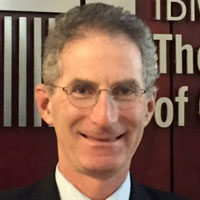 Daniel Chenok, Executive Director, IBM Center for The
Business of Government
Daniel Chenok, Executive Director, IBM Center for The
Business of Government
1:30 Modern Day Innovative Governance
 Jonnie Bradley, Senior Program Manager
for AI Strategy, Governance, & Partnership Development, Artificial Intelligence & Technology Office, U.S. Department of Energy
Jonnie Bradley, Senior Program Manager
for AI Strategy, Governance, & Partnership Development, Artificial Intelligence & Technology Office, U.S. Department of Energy
This discussion will delve into the use of AI in an era where there are profound concerns to ethical practices and behaviors, and how critical innovative governance is needed in today’s AI ecosystem? In addition, the discussion will highlight
the impacts of governance or the lack thereof to citizens.
1:55 Considerations for Explainable AI and Real-World Data in Health Policy and Practice
 Rachele Hendricks-Sturrup, DHSc, MSc, MA, Research
Director, Real World Evidence, Duke-Margolis Center for Health Policy
Rachele Hendricks-Sturrup, DHSc, MSc, MA, Research
Director, Real World Evidence, Duke-Margolis Center for Health Policy
Join leading expert, Dr. Rachele Hendricks-Sturrup, as she provides and overview of real-world data and explainable AI and offers use case examples. She will also discuss policy implications for real-world data and explainable AI moving forward.
2:20 Ransomware, Defense & Resilience Strategies
 Brett Tucker, Technical Manager, Cyber Risk Management,
Software Engineering Institute, Carnegie Mellon University
Brett Tucker, Technical Manager, Cyber Risk Management,
Software Engineering Institute, Carnegie Mellon University
Seth Swinton, Senior Cybersecurity Project Manager, Methodology Branch, Cybersecurity Infrastructure Security Agency
Ransomware has become the imminent threat to most organizations. Where most traditional cyber-attacks involved extended threat actor engagement to seek out critical information, export, and demand ransom from victims, ransomware contracts the
process and places immediate pressure on the victim to respond with payment. Unfortunately, the rise of AI and other novel attack techniques have made these attacks more ubiquitous as they are pernicious. This talk will discuss a novel means
for assessing an organization to determine its susceptibility to ransomware as much as explore the organization’s resilience to recover normal operations considering a successful attack. Attendees will discover the key domains for analysis
as well as practical tips for facilitating the assessment.
2:45 Networking Refreshment Break in the Exhibit Hall
3:25 Implementing Responsible, Human-Centered AI
 Carol Smith, Senior Research Scientist, Human-Machine Interaction,
AI Division, Carnegie Mellon University
Carol Smith, Senior Research Scientist, Human-Machine Interaction,
AI Division, Carnegie Mellon University
AI systems augment humans at work and at play, and their dynamic nature requires significant awareness of the data they are built on, how models influence the experience, and flexibility regarding design choices. Doing the speculative work to
identify potential negative outcomes and harms requires uncomfortable discussions and entirely new domains of practice. There are already many examples of existing historical bias being replicated, and unintentional, but significant harms
affecting broad populations. Identifying and considering the benefits and limitations of these systems is challenging enough. Determining how, and to what extent, these systems will augment their human partners; what that exchange "feels"
like and how it changes over time; and how we will keep people safe and in control, can be intimidating. Learn to wield technology ethics to make systems that are accountable, de-risked, respectful, secure, honest, and usable. The presenter
will introduce the topic of ethics and then step through a framework to guide teams successfully through this process.
3:50 Panel Discussion: Responsible AI as an Organizational Strategy
 Moderated by: Ricardo Baeza-Yates, Professor and Director
of Research, Institute for Experiential AI, Northeastern University
Moderated by: Ricardo Baeza-Yates, Professor and Director
of Research, Institute for Experiential AI, Northeastern University
 Panelists: Cansu Canca, PhD, Ethics Lead & Research
Associate Professor, Institute for Experiential AI, Northeastern University
Panelists: Cansu Canca, PhD, Ethics Lead & Research
Associate Professor, Institute for Experiential AI, Northeastern University
 Ola Olude-Afolabi, PhD, AI - PM & Administrator,
DOC AI Center of Excellence - OCTO, U.S. Department of Commerce
Ola Olude-Afolabi, PhD, AI - PM & Administrator,
DOC AI Center of Excellence - OCTO, U.S. Department of Commerce
 Laura Biven, PhD, Lead, Integrated Infrastructure and Emerging
Technologies, Office of Data Science Strategy (ODSS), National Institute of Health (NIH)
Laura Biven, PhD, Lead, Integrated Infrastructure and Emerging
Technologies, Office of Data Science Strategy (ODSS), National Institute of Health (NIH)
 Carrie Gardner, Project Lead, AI Division, Carnegie Mellon
University Software Engineering Institute
Carrie Gardner, Project Lead, AI Division, Carnegie Mellon
University Software Engineering Institute
We explore the key questions that governmental agencies need to ask themselves before and during the design and deployment of a new AI support tool to ensure responsible use of AI systems. These include a range of ethical, legal, and technical
questions such as those on competence, bias, and rights.
AI ethics principles are a part of a broader responsible AI strategy, which include guiding materials and tools for ethical decision-making in AI, processes to integrate ethics into AI development and deployment, and specific roles for ethical
decision-making in AI. The audience will learn how to implement responsible AI in their organization in a comprehensive, actionable, and robust manner. Examples will be shared from different federal department and agency initiatives.
4:30 Closing Remarks
 Daniel Chenok, Executive Director, IBM Center
for The Business of Government
Daniel Chenok, Executive Director, IBM Center
for The Business of Government
TRACK 3: Scaling and Operationalizing AI
ROOM LOCATION: Constitution B
Friday, October 7, 2022 |1:00 - 4:00pm ET
1:00 pm Chairperson’s Remarks
 Michael Mattarock, Program Development Lead, AI
Division, Carnegie Mellon University Software Engineering Institute
Michael Mattarock, Program Development Lead, AI
Division, Carnegie Mellon University Software Engineering Institute
1:15 Democratization of Analytics
 John Landers, Senior Solution Engineer,
Alteryx Public Sector
John Landers, Senior Solution Engineer,
Alteryx Public Sector
1:40 Driving AI Application Development Through Industry Collaboration
 Thomas Ruoff, Methodology Branch
Chief, Cybersecurity and Infrastructure and Security Agency
Thomas Ruoff, Methodology Branch
Chief, Cybersecurity and Infrastructure and Security Agency
 Gary Jones, CISA CTO, US Dept of Homeland Security
Gary Jones, CISA CTO, US Dept of Homeland Security
This presentation will provide an overview of AI capabilities currently used and sought after by CISA. Summary of current capabilities and demand areas will be followed by a discussion of a specific protective email and risk content measurement
capability that could be greatly enhanced by AI/ML. The desired outcome is a robust approach to evaluating risk content in the delivered email messages and attachments. Industry insight and recommendations for the potential approach are
most welcome and much appreciated.
2:05 AI-Powered Applications: Establishing Mature Data Governance Practices for Transforming Teams
 Bryan Lane, Chief, Business Intelligence Services, Federal
Deposit Insurance Corporation (FDIC)
Bryan Lane, Chief, Business Intelligence Services, Federal
Deposit Insurance Corporation (FDIC)
As digital technologies such as artificial intelligence are adopted on a broader scale, implementing a tailored and mature approach to data governance is critical. Listen in, as Bryan Lane, Chief, Business Intelligence Services of the FDIC
discusses key elements that are present within a successful data governance strategy and actionable advice for putting into practice a framework that best suits your organization.
2:30 Coffee Break
2:40 Responsible AI: How to Measure, Manage and Operationalize
 Susannah Shattuck, Head of Product,
Credo AI
Susannah Shattuck, Head of Product,
Credo AI
Everyone seems to be talking about responsible AI these days—but what does “responsible” actually mean, and how should AI/ML development teams incorporate ethics into the development lifecycle? This talk will move beyond
buzzword bingo to define the key features of a Responsible AI system and discuss how to measure and manage and operationalize these features during development, from design to production. Susannah Shattuck, Head of Product at Credo AI,
will share best practices from the field and tactical approaches that you can begin using today.
3:05 MLOps & Operationalizing AI/ML Workloads on AWS
 Ashley Miller, Sr. AI/ML Evangelist,
AWS
Ashley Miller, Sr. AI/ML Evangelist,
AWS
Many organizations are implementing artificial intelligence and machine learning in their environments. But ML code is just a small part of the overall picture and deploying ML at scale has additional challenges. In this session we will discuss how to optimize ML workload deployments using MLOps mechanisms including foundational ML architectural terms and practices.
3:30 Better AI Solutions with an AI Engineering Body of Knowledge
 Michael Mattarock, Program Development Lead, AI
Division, Carnegie Mellon University Software Engineering Institute
Michael Mattarock, Program Development Lead, AI
Division, Carnegie Mellon University Software Engineering Institute
Federal leaders seek to obtain the leap-ahead capabilities offered by Artificial Intelligence (AI), yet many challenges stand in their way. The creation of an AI Engineering Body of Knowledge (BoK) establishes common principles and practices
to support practitioners in delivering reliable, responsible, safe, fair, and transparent solutions. In this session, we will explore the dynamic AI Engineering BoK concept currently under development by the Carnegie Mellon University
Software Engineering Institute and how it can be used across diverse organizations.
3:55 Closing Remarks
 Michael Mattarock, Program Development Lead, AI
Division, Carnegie Mellon University Software Engineering Institute
Michael Mattarock, Program Development Lead, AI
Division, Carnegie Mellon University Software Engineering Institute
4:00 Close of AI World Government
TRACK 4: Emerging AI Technologies
ROOM LOCATION: Constitution A
Friday, October 7, 2022 |1:00 - 4:00pm ET
1:00 pm Chairperson’s Remarks
 Alexis Bonnell, Emerging Technology
Evangelist for Government and Strategic Business Executive, Google
Alexis Bonnell, Emerging Technology
Evangelist for Government and Strategic Business Executive, Google
1:15 Purposeful AI in National Security
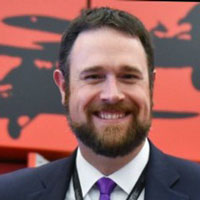 Brian Drake, Federal Chief Technology Officer, Accrete
AI Government
Brian Drake, Federal Chief Technology Officer, Accrete
AI Government
As the national security apparatus matures, it is falling into the trap of funding AI/ML projects which are achievable, but not meaningful. This talk will help government executives think about how to refocus their efforts on projects which
deliver impacts against adversaries.
1:40 Utilizing Emerging AI Technologies as Part of the Digital Transformation at NASA
 David Na, Lead for Cloud AIML Foundations, Information,
Data & Analytics Services – Data Science Services, NASA
David Na, Lead for Cloud AIML Foundations, Information,
Data & Analytics Services – Data Science Services, NASA
Explore NASA’s AI/ML transformation strategy and implementation progress, focusing on learning and development approaches, outreach, and the latest emerging technologies being utilized. AI/ML learning and development has included assessing
the workforce’s needs, organizing available learning assets, and providing easy mechanisms to choose materials. Finally, like many organizations, NASA must guide early adopters of AI in ethical use; Mr. Na will share NASA’s
initial approaches to ethical AI.
2:05 Few Shot and Zero Shot Learning: The Future of AI is Large Language Models (LLM)
 Anil Tilbe, Scientist, Department of Veterans Affairs
(VA)
Anil Tilbe, Scientist, Department of Veterans Affairs
(VA)
Applications of Large Language Models (LLM) at the intersection of zero shot and few shot learning. Also:
1. What are LLM;
2. How Zero Shot learning was implemented at the VA; and
3. Future use cases:
- System-for-System (SfS) for intelligence gathering
- Text-to-Image pipeline implementations
- AI-based Zero-Shot decisional reasonings
2:30 Coffee Break
2:40 Metaverse for Government: Serving Citizens in the Metaverse
 Kashyap Kompella, CFA, Chief Analyst, RPA2AI Research
Kashyap Kompella, CFA, Chief Analyst, RPA2AI Research
What is the Metaverse?
- How does AI enable the Metaverse?
- What opportunities does it create to further your agency mission?
- Does it create any risks and how to mitigate them?
3:05 FIRESIDE CHAT: USPTO: People-powered AI for America’s Innovation Agency
 Henry (Jamie) Holcombe, Chief Information Officer,
United States Patent and Trademark Office (USPTO)
Henry (Jamie) Holcombe, Chief Information Officer,
United States Patent and Trademark Office (USPTO)
3:30 Applications of AI/ML for DoD Aviation Maintenance
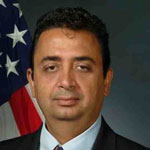 Frank Zahiri, Engineering Lead, US Air Force
Frank Zahiri, Engineering Lead, US Air Force
 Abeezar Tyebji, CEO, Shipcom Wireless
Abeezar Tyebji, CEO, Shipcom Wireless
Sam Ansari, CTO, Shipcom Wireless and Professor at Data Analytics Engineering department at George Mason University
3:55 Closing Remarks
 Alexis Bonnell, Emerging
Technology Evangelist for Government and Strategic Business Executive, Google
Alexis Bonnell, Emerging
Technology Evangelist for Government and Strategic Business Executive, Google
4:00 Close of AI World Government